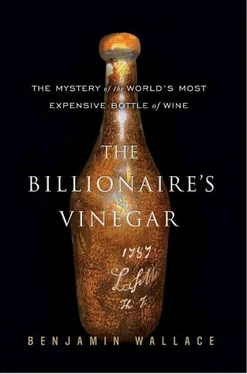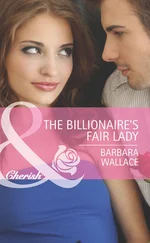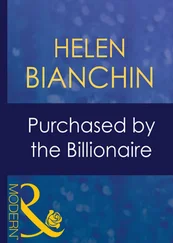Benjamin Wallace
THE BILLIONAIRE’S VINEGAR
The Mystery of the World’s Most Expensive Bottle of Wine
To my parents,
and in memory of Claire Wickham Woodroffe
CHAPTER 1

LOT 337
AHUSH HAD COME OVER THE WEST ROOM. PHOTOGRAPHERS’ flashes strobed the standing-room-only crowd silently, and the lone sound was the crisp voice of the auctioneer. To the world, Michael Broadbent projected a central-casting British cool, but under the bespoke suit, he was practicing a kind of mind control that calmed him in these situations. The trick was to focus narrowly, almost autistically, on numbers: lot number, number of bidders, paddle numbers, bid steps.
Even after all these years, he still found it bracingly creative to conjure excitement out of a heap of dirty old bottles. No matter how many of them the fifty-eight-year-old Broadbent might see, he retained his boyish sense of marvel at the longevity of wine. Inert antiques were all very well, but there was magic in old wine—a mysterious and wonderful alchemy in something that could live and change for two hundred years and still be drinkable.
Auctioneer was Broadbent’s most public role, but it was only one of his distinctions in the wine world. In London he cut a familiar figure, pedaling to work each day on his Dutch ladies’ bicycle with basket, legs gunning furiously, a trilby hat perched on his head. Often he was elsewhere, and he kept up a brutal schedule. As founding director of the Christie’s wine department, he had spent the last two decades crisscrossing the planet, cataloging the dank and dusty contents of rich men’s cellars, tasting tens of thousands of fine wines, and jotting his impressions in slender red hardcover notebooks. Those unassuming scribblings amounted to the most comprehensive diary of wine ever recorded. That diary now consisted of sixty of the Ideal notebooks, and he had collected them in a published tome that was the standard reference on old wines. Under Broadbent’s direction, Christie’s had largely invented and come to dominate the global market in old and rare wines. While Christie’s as a whole was smaller than its great rival, Sotheby’s, its wine department was more than twice as big, bringing in £7.3 million the previous season.
Broadbent’s peers in the trade acknowledged that his palate was the most experienced in the world. His pocket textbook on wine tasting, the definitive work of its kind, was in its eleventh edition, having sold more than 160,000 copies, and had been translated into eight languages. Any collector hosting an event that aspired to any seriousness made sure to invite Broadbent and his famously sensitive nose. When he arrived at a wine gathering, if so much as a trace of woodsmoke or the merest whiff of cigarette ash besmirched the air, Broadbent would scrunch up his nose, and everything would come to a halt while windows and doors were flung open.
A lean six feet tall, Broadbent had a fringy sweep of whitening hair, and his smile, distinctly hail-fellow-well-met, was tempered by the cocked eyebrow of a worldly man. He looked more aristocratic than many of the dukes and princes alongside whom he sat on Christie’s board of directors.
When Broadbent tasted, he would lay his wristwatch next to his little red notebook, so that he could time the wine’s changes in the glass. During lulls, if a piano was on hand, he might charm guests with some Brahms, or he might go off by himself to sketch the local scenery.
He was happy to opine, at these tastings, on the wines under consideration. He had a knack for putting wine into memorable words. Sometimes he borrowed from literature, describing one wine as “black as Egypt’s night.” More often, he minted his own rakish descriptions, seeing a woman in every wine. A ’79 Pétrus reminded him of Sophia Loren: “You can admire them, but you don’t want to go to bed with them.” A double magnum of ’47 Cantenac-Brown evoked chocolate and “schoolgirls’ uniforms.”
THE TASTE OF the wine he was selling right now in London, just past 2:30 p.m. on Thursday, December 5, 1985, was impossible to know. December 5 had special meaning for Broadbent; it was the same date that James Christie, in 1766, had held the auction house’s very first sale. Moments earlier, Broadbent had stepped up to the rostrum in a three-piece suit with a pocket square, and peered out at the room through his eyeglasses.
Lot 337 was the first item of the afternoon session and had been carefully removed from its green felt berth in a glass case nearby. Lucy Godsal, a secretary in Broadbent’s office, held the bottle aloft for the room to see. She looked very Christie’s—blond, headband, pearl necklace—and Broadbent liked her; she was smart, hardworking, and pretty.
Broadbent had never sold anything quite like this before. A Château Lafite from 1787, it was the oldest authenticated vintage red wine ever to come up for auction at Christie’s. And that was the least of its merits. The bottle was engraved with the initials “Th.J.” As Broadbent had described it in the auction catalog, “Th.J. are the initials of Thomas Jefferson.” Almost miraculously, the bottle was full of wine and appeared to have survived two centuries intact. The container itself was beautiful and distinctive. “This is one time,” Broadbent quipped to the crowd, “when the buyer will get something back on the bottle.”
The admittedly fragmentary tale of how the bottle had been found only added to its mystique. According to Hardy Rodenstock, the German collector who had consigned the bottle to Christie’s, in the spring of 1985 workers tearing down a house in Paris had broken through a false wall in the basement and happened upon a hidden cache of extremely old wines. The Lafite, inscribed with the initials of the Founding Father, who had lived in Paris from 1784 to 1789 and was the foremost American wine connoisseur of his day, had been among them.
The integrity of the seals, and the high fill levels, Rodenstock had told Broadbent, were remarkable for their age. The cellar had been almost hermetically preserved, its steady temperature in the sweet spot of 50 to 57 degrees Fahrenheit. Rodenstock theorized that the bottles had been walled up to protect them during the chaos of the French Revolution, and had lain undisturbed for two hundred years.
Not surprisingly, Rodenstock refused to divulge the precise location, the exact number of bottles, or anything else about the discovery, despite Broadbent’s entreaties. Rodenstock was the leading private collector in Europe, and he had already made a name for himself in rare-wine circles as an unusually skilled bottle hunter. Though he was a longtime customer of Christie’s, Rodenstock was a competitor when it came to obtaining private cellars. Private-cellar purchases were often cash deals that went unreported to tax authorities. A certain reticence about his sources was to be expected.
Broadbent felt there were a couple of possibilities. One was that the bottle had indeed been discovered during the excavations of the old Marais district in Paris, much of which had recently been torn up and redeveloped. A rumor less credited by Broadbent, and which he had no intention of putting in the catalog copy, was that the bottle had been part of some sort of Nazi cellar.
Broadbent knew Rodenstock well, trusted him, and would not normally be too concerned with how he had obtained the bottle. But to Broadbent’s annoyance, a historical researcher in America had recently been making noises in the press, questioning whether the bottle was in fact Jefferson’s. Broadbent had conducted his own research and was satisfied that the circumstantial evidence argued overwhelmingly in favor of the attribution. He couldn’t prove it, but on balance, the inducements to proceed outweighed any risk of embarrassment.
Читать дальше














